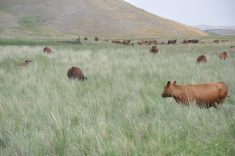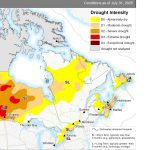Water smart; Simple living; Good report; Producer sympathy; Vote explanation; Economic tale; Thanks, Ryan
Water smart
Make a start, be water smart. Such advertisements sponsored by the Manitoba government appeared in daily and weekly newspapers explaining how small changes would protect and save our precious water. All well and good.
However, while Manitobans are choosing to preserve and protect water, government is allowing hog slurry to be spread on frozen ground ….
This is not a first. It seems each winter, Manitoba Conservation will permit such an irresponsible act to take place. Such action ultimately will end up polluting our water sources and in this latest reported case, Lake Winnipeg.
Read Also

Late season rainfall creates concern about Prairie crop quality
Praying for rain is being replaced with the hope that rain can stop for harvest. Rainfall in July and early August has been much greater than normal.
Conservation means “the act of keeping or protecting from loss or injury and the preservation of natural resources; forests, rivers, environment, etc.”
To do anything contrary or less is an act of betrayal.
It is my opinion (that) those water smart advertisements and the fact that Conservation continues to allow manure pollution to our water sources are nothing more than true examples of government hypocrisy.
I suggest … ministers and bureaucrats in our government are oblivious to what is going on when they make insulting decisions that abuse a most precious element, water.
So while we, as Manitobans, choose to protect and preserve our water sources, the government allows yet another nail into the coffin of Lake Winnipeg.
– John Fefchak,
Virden, Man.
Simple living
Back in the 1930s and 1940s, people lived very simply. They had no credit cards so they did not spend money that they did not have. They did not go to cafes much, no expensive jewelry or high priced cars.
When the 1950s came along, things got better. We made progress. Every generation after the war got richer. People went from a two bedroom to a four bedroom or bigger house, better cars.
Then came the 1980s. Things slowed down. Interest went from 11 percent to 24 percent. I lost most of my land, lots of farmers went bankrupt and so did some businesses. Banks called in their loans. … I was able to start again as the credit unions would lend money.
Along comes the 1990s. Things pushed up, people bought bigger cars, went from a $10,000 home to $200,000 or $400,000 homes. Then along comes 2008: recession, financial crisis, people lose jobs. A financial crisis hit Wall Street and Bay Street. Easy money stops, economic growth stops, people start to lose their homes, go bankrupt. …
In the great depression (people) did not worry about their lifestyle. All they wanted to do was survive…. Do like our parents did. Give up wanting everything (you) can’t afford. Go back to simple living like your grandparents.
– Jack Pawich,
Cartwright, Man.
Good report
I am not a National Farmers Union member but have read their report, The Farm Crisis and the Cattle Sector: Towards a New Analysis and New Solutions, which is available at www.nfu.ca
It is obvious that this excellent report’s primary purpose was to educate and to come up with a solution for our industry’s problems – not a checkoff fundraising project nor recruitment for membership.
This organization has completed a project about a very serious issue, our livelihood, on behalf of all farmers at great expense with only funding from their membership.
All farmers who obtain and read this analysis will have a better appreciation of the personal/financial sacrifice and efforts of NFU members in bringing this report to completion.
It is important to recognize that these farm families should not carry this burden alone. They need our support now and in the future.
I encourage all livestock producers to read this report and mobilize all farm groups and local governments in demanding of our federal and provincial governments that they apply the very real solutions presented in this report.
– Sandra White,
Fairview, Alta.
Producer sympathy
Livestock producers aren’t paid nearly enough for their product. Calving season is around the corner. No overtime considered in the bottom line.
May they all have scour-free, smart calves, easy calving, warm weather and a safe, no hassle calving time.
– Evelyn Schnaider,
Barthel, Sask.
Vote explanation
In his Jan. 22 letter (Value chains) concerning the recent Canadian Wheat Board director elections, Thomas Hewson of the Western Barley Growers Association laments, “only one out of the five elected is a marketing choice supporter.”
He further states the results are a direct contradiction of the October federal election. There the Harper government, which supports an end to the monopoly, received overwhelming support.
He doesn’t seem to understand how this could be.
There is a simple explanation. Grain producers in the CWB designated area represent less than three percent of eligible voters. In other words, grain producers’ voting power in a federal election is extremely minimal.
When 97 percent of those who cast ballots are not grain producers, how can anyone come to the conclusion that a majority of grain producers supported the Harper government and their anti CWB agenda? This smacks of wishful thinking and little else.
It is quite apparent that many arch Conservatives won’t let truth or fact intrude when they are in conflict with their rigid ideology or when they want to believe otherwise.
– George E. Hickie,
Waldron, Sask.
Economic tale
Once upon a time, we had a vibrant economy. Once upon a time, we had very little unemployment but like so many bedtime stories, it did not always play out the way we wanted.
In 2008, we saw the drop of the stock markets, the loss of credit and in general the beginning of a full fledged depression.
In the last few months, I have listened to many older or retired investors, (who) have some very sad stories to tell. For most, they have lost any hope of early or a comfortable retirement. For most, the money they were going to buy that special retirement reward just went sour.
For most, the decision to cut and run or ride it out has come front and centre. If you listen to your banker or investment councillor, they will advise you to ride it out. If you listen to your own mind, you want to cut and run.
Some very educated people say the following.
This recession will not go away in the near future. Some say it will take to 2010, some say that if it is like the Dirty Thirties, it will take several years. If indeed this is the case, you personally have to answer the following questions.
If I cash in and take my money out, can I invest in something else that within several years will regain my original principal? You must remember that no matter what you do, you will not gain any interest in any mode until you have regained your original principal amount.
I believe that if your loss is about 22 percent of your original amount, then a good guaranteed income certificate will regain your loss within five to six years using compound interest.
If your loss is approximately 50 percent, then you will take more than eight to 10 years to gain this and maybe it is best to ride it out.
The question here is, at what age are you now and can you afford the time frame?…
Trust your own instincts. What works for one will not always work for others. If you’re losing sleep over it, then take another approach. …
As far as the stock market, if there is an upswing, review where you are at and invest conservatively.
I believe that we were always told: do not put all your eggs in one basket….
– Bob Thomas,
Regina Beach, Sask.
Thanks, Ryan
I’ve been reading Ryan Taylor’s write-ups since he started writing in the paper.
I must say thanks to Ryan Taylor and his Cowboy Logic in The Western Producer every second week, which is always interesting and sometimes quite funny, what’s going on, on his ranch….
– Olga Babyn,
Derwent, Alta.
















